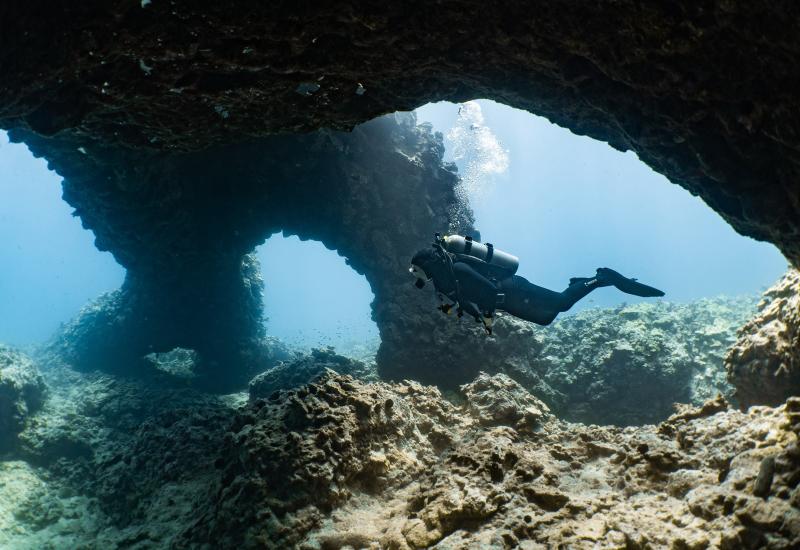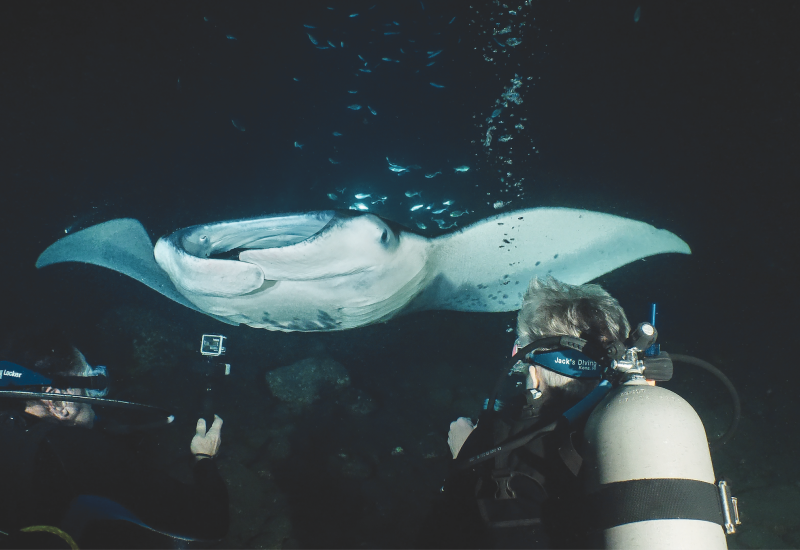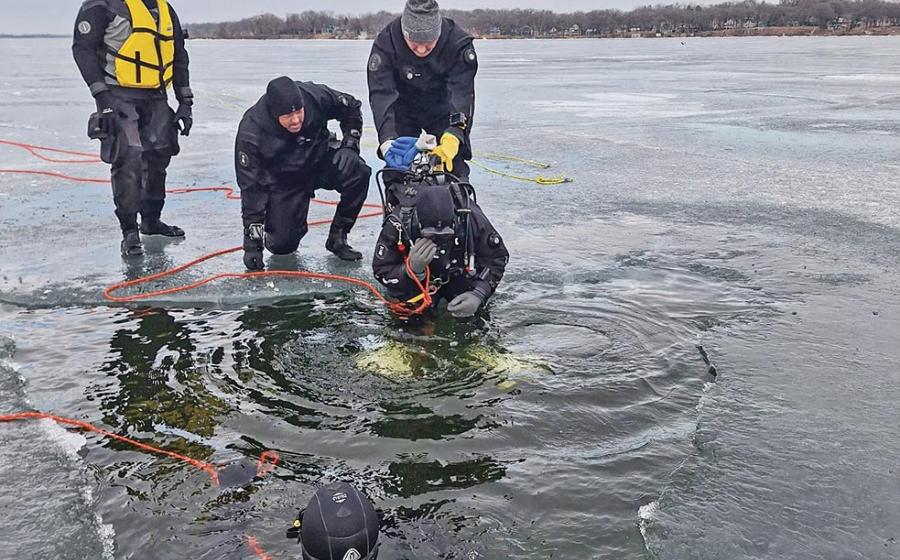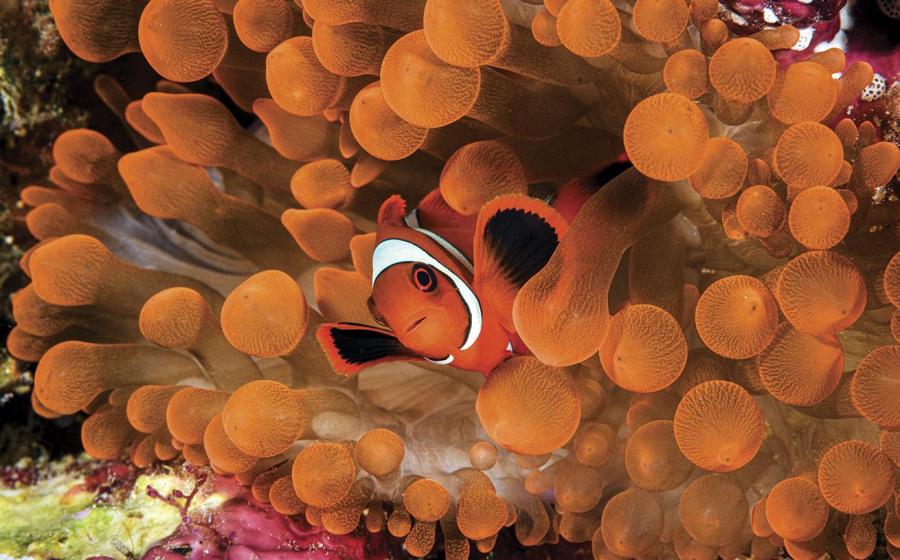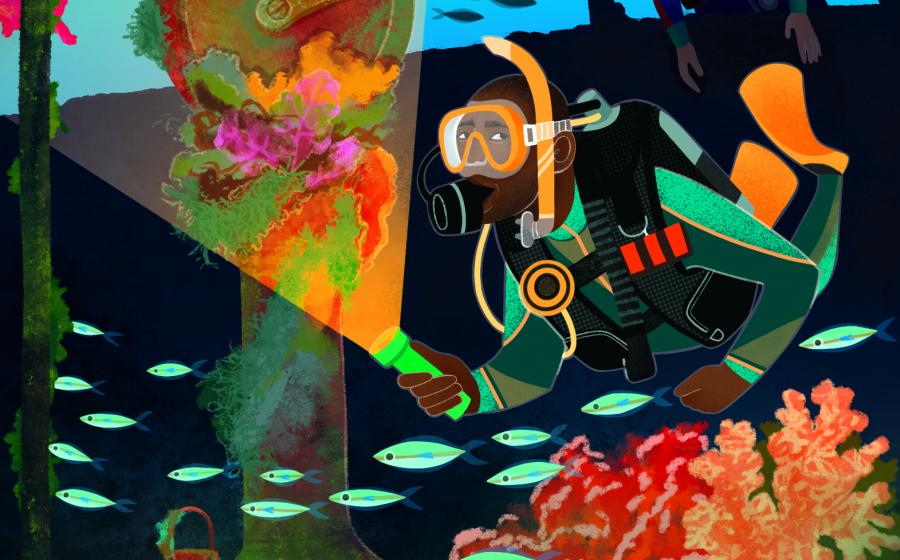Diving with Dementia
“Diver in the kelp! Stay where you are; we’re coming to help you!”
The words reverberated through the boat’s loudspeaker as my wife hovered somewhere below on her first training dive. I scanned the water, searching.
I wasn’t a diver, and I wasn’t going to be. I can barely swim. But Rebecca had already shared with me what she’d learned: Kelp becomes dangerous when panicked divers twist until they are trapped.
Long minutes passed before I learned the kelp-entangled diver wasn’t my wife. It wasn’t even anyone from our boat. Just some other diver who’d learned the hard way.
Rebecca passed her class with flying colors. Unlike me, she’s basically a fish. She’d live in the water if she could.
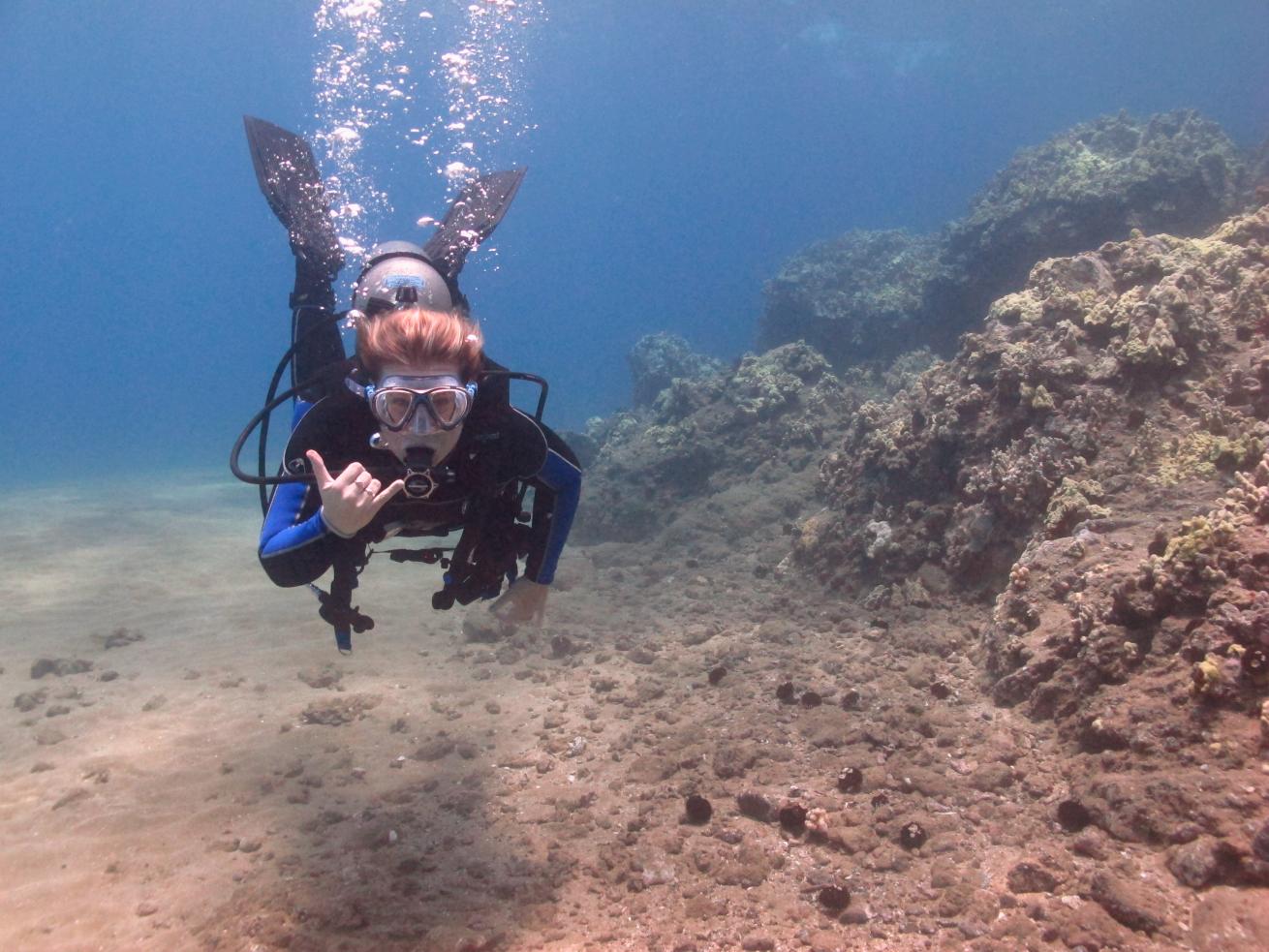
Courtesy Michael CarleyRebecca signals her joy while diving in Hawaii in 2015, the year after her Alzheimer's diagnosis.
For a while, it seemed like she might. Soon, she was an advanced diver, then a rescue diver. Our son was born the year after her first certification. Through the first few years of his life, scuba diving was her second-favorite activity, next to motherhood.
Soon, she had 20 dives in her log, then 25. Before long, it seemed, she’d be a divemaster herself, getting paid to take others out and bring them back safely, wonder in their eyes.
The scare from that first trip became a joke between us, but I never stopped worrying, even though Rebecca was a cautious diver. She knew limits and how to keep herself and others safe.
To me though, she was still taking her life in her hands. Going under water and still breathing? Didn’t we evolve out of that a few million years ago? For someone who can barely make it to the edge of the pool, it didn’t seem natural. I value control, and that means two feet on the ground.
But there was no denying the joy it brought her. She dove every chance she could, witnessing coral of every type, fishes large and small, graceful sea turtles. She basked in the wonder of the natural world. Her caution (eventually) helped me relax.
Until she started forgetting.
Not her caution, or anything about diving. But appointments, things we’d discussed just moments before. She started repeating herself, asking questions I’d just answered, and exhibiting other increasingly bizarre behaviors.
The issue rose to medical intervention. A series of doctor visits and tests brought the verdict in July, 2014: early-onset Alzheimer’s disease. Rebecca was just 45, with no family history of dementia. Our son was six.
We experimented with denial, but dementia moves with riptide ferocity. Rebecca failed her driving test in spring 2015 and was now stuck at home while I worked. To soften the blow, we made a deal—we sold her car, but used the proceeds for a Hawaiian vacation.
Should she dive during the trip? Her Alzheimer’s specialist said there was no medical reason against it and left it up to her general practitioner, who signed off in case there was any concern on the part of a dive master or instructor.
Upfront about Rebecca’s limitations, we found a dive shop, Maui Dreams, that would take her out for a one-on-one shore dive.
She came back exhilarated, describing her sightings in vivid detail and bragging about how little air she’d used on her hour-plus dives. Rebecca took pride in sipping air like a sommelier at a tasting.
It was not until the next day that she collapsed from exhaustion, requiring a wheelchair to make it to the airport gate.
But we had no regrets. Rebecca had her usual thrill, though the details faded with her diminishing short-term memory. As for me, I found it amazing she remembered how to dive longer than drive. But I knew each trip could be her last, so I was happy to give her a moment of joy.
The next summer brought dementia progression, a family trip to San Diego and Rebecca’s only diving accident.
Rebecca retained few organizing skills, so I made the arrangements with a local shop for a one-on-one dive. Upon arrival, we found a four-person dive group instead.
Still, Rebecca’s partner was a divemaster. We figured there would be no problem.
But later that afternoon came the phone call. Rebecca was in the hospital.
Getting details from someone with diminished short-term memory isn’t easy, but between Rebecca’s account and that of the dive operator, I pieced together that she’d become separated from her buddy. At that point, she remembered her training, waiting a minute or two before ascending. But upon surfacing, she forgot to inflate her BCD. The waves battered her, likely causing her to swallow sea water.
I was angry. Angry with the dive shop, angry at the situation. But mostly I was relieved that my wife was still with me.
No more diving, I thought.
Like a mind reader, she pleaded from her hospital bed to dive again. I evaded answering.
Maybe, I thought, by next year, her memory will have devolved enough that the question will answer itself.
But…the best-laid plans.
I don’t recall how I got talked into it, but in the summer of 2017, we were headed back to Hawaii.
Rebecca’s dementia was worse than in San Diego. Should it stop her from diving?
“Even if something does happen, at least it would be while doing something she loves,” said a scuba diving friend.
By this point, I knew enough about dementia to understand that the later stages would come with a quality of life deficit that might make both Rebecca and I wish the disease would progress faster, that the end would come sooner.
But knowing isn’t feeling. I wasn’t ready to give her up.
I agonized. Most people were supportive of her diving, but one of her best friends worried openly. I constantly second-guessed myself as the trip neared.
After sharing her diagnosis and previous incident with Jack’s Diving Locker, a dive shop on the Big Island, they felt prepared to care for her underwater. Their clients included injured combat veterans, and people with many disabilities, including at least one person with no arms or legs. A little dementia was not going to stop them.
With the dive settled, I took our son out for a dragonfruit smoothie. He sipped, I worried.
Needlessly, as it turned out. It went well. Rebecca forgot a few steps, entering the water once without her mask, but she was back with me, safe and sound.
A few weeks later, the photos and video arrived. They had taken good care of my wife, holding her hand, guiding her. And I got to see what she’d talked about so many times: amazingly clear coral, schools of fish, tangs, an unbelievable closeup of a trumpetfish.
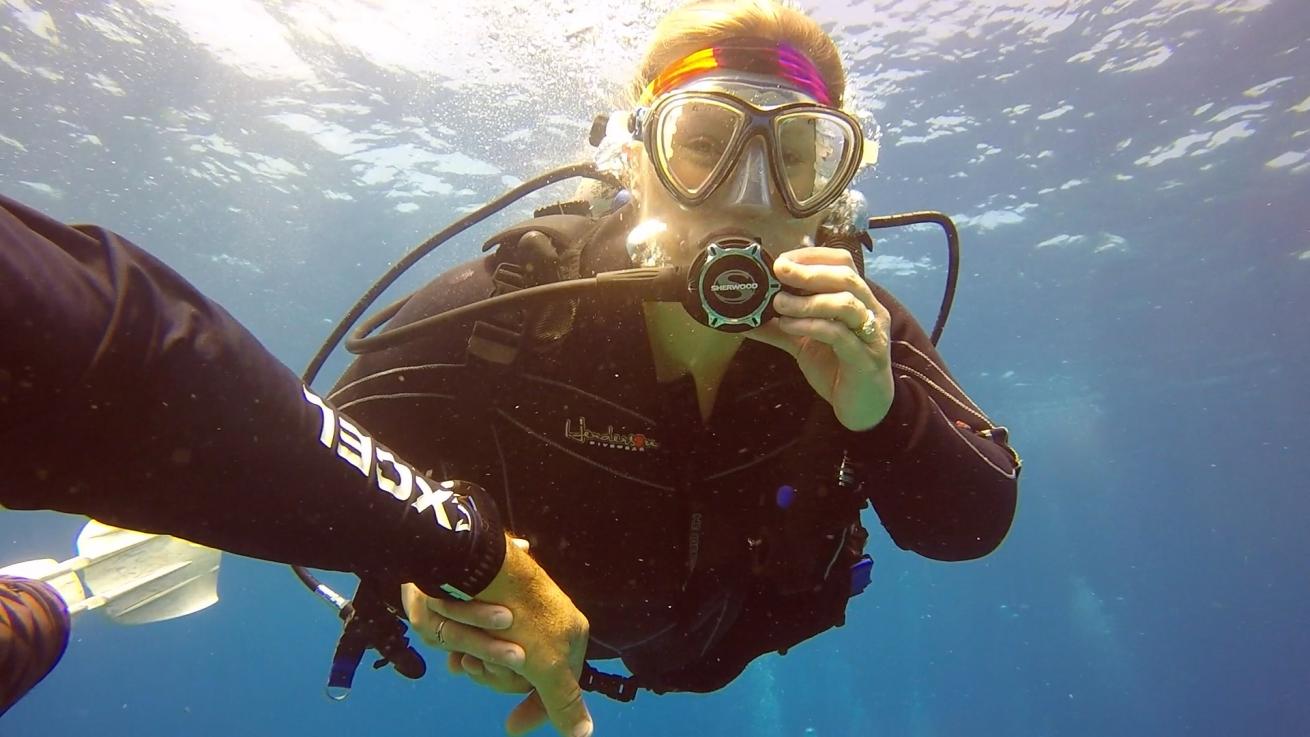
Courtesy Michael CarleyRebecca dives Hawaii's reefs hand-in-hand with an employee of Jack's Diving Locker.
Dementia progresses, always. I steered our next vacation away from scuba. After that, her disease prohibited travel.
In May, I had to place Rebecca in a skilled nursing facility for her own safety, where she passed near the end of June.
Looking back, I have many regrets from the past few years. Dementia caregiving requires enormous patience, which is hardly my strong suit. I’ve had many bad moments, and I’ve set a bad example for our son more than a few times.
But those dives, I cannot regret. What dementia taught me, if nothing else could, is that the control I was seeking was an illusion. I never had my feet on the ground in the first place and never would. Rebecca didn’t either, and didn’t care.
Like that diver caught in the kelp, I had to relax and let go, and let her do the same. Her life, which I worried I was putting in danger, wasn’t mine to risk. It was hers, and she had to use each moment given to her, fleeting as each of them was, to experience the raw beauty at her disposal.
Related:
- Scuba Diving in Hawaii
- Sea Hero Charles Beeker Begins Adaptive Scuba Program
- The Real-Life Superheroes of Scuba Diving



